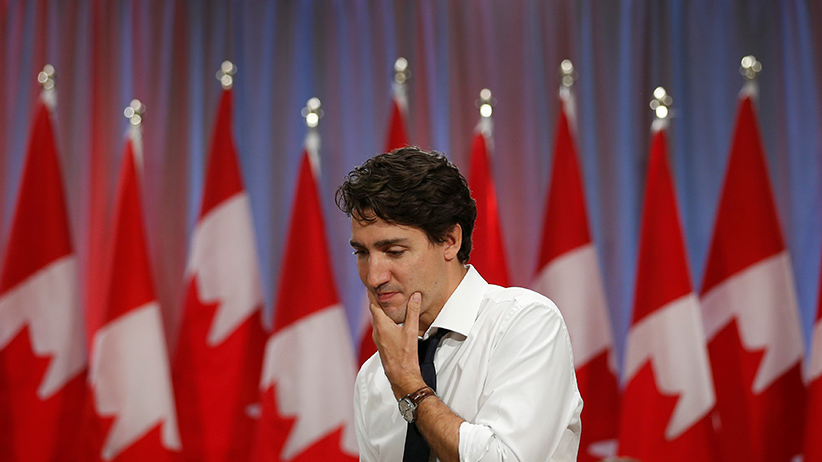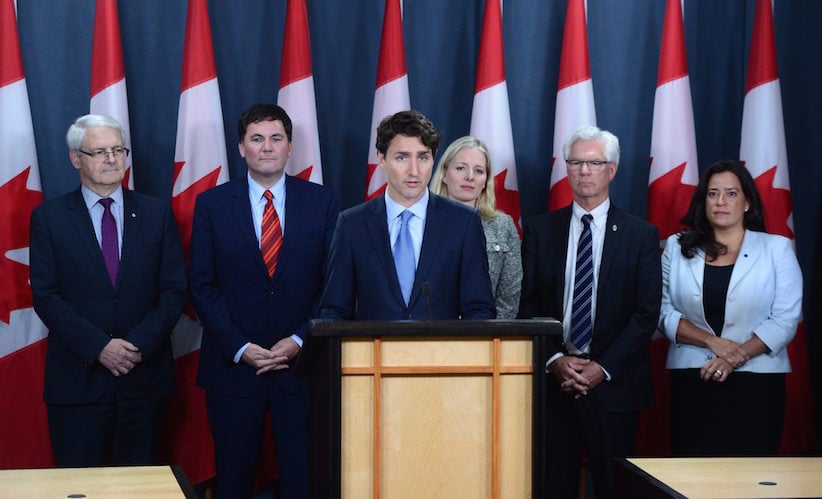Wobbles aside, Justin Trudeau’s honeymoon continues
The Trudeau Liberals can still look at their record and, despite the screw ups, happily match it against any government’s first year in office
Share

Apologies. Protests. Gaffes. It’s been a bad few weeks for the Liberals and the “Honeymoon is Over” song is once again playing for Justin Trudeau. Are they really losing the plot after a year in power? The short answer is no. The polls remain nose bleed high even as they blunder around on a wide variety of issues. The long answer is … no. Just over a year into their mandate, the Liberals are still looking at their record and, despite the screw ups, would happily match it against any government’s first year in office, even any government’s entire mandate.
That’s not to dismiss the recent spate of mistakes as meaningless. The Liberals’ political Teflon is being chipped by clunkers like the Prime Minister’s laudatory statement about Fidel Castro, in which he brushed off decades of human rights abuse in Cuba as merely “controversial.” That led to mocking #TrudeauEulogies on social media that were savagely hilarious. The viral PM suddenly went viral in all the wrong ways. It’s one thing for a politician to be criticized—they all expect that—but when you become a national punch line it really hurts.
Meanwhile, the allegations about so-called cash-for-access fundraising dog the party. This week interim Conservative leader Rona Ambrose asked the ethics commissioner to investigate the possibility that the fundraisers breach the Conflict of Interest Act. The Liberals have deployed a parsing, talking-pointy defence, focusing on the legalities of fundraising and it’s hard not to think of Bill Clinton’s famous 1998 reply to questions about his dalliance with Monica Lewinsky—“it depends on what your definition of ‘is’ is?” This “unsavoury” issue–the ethics commissioner’s word—will keep inflicting damage until the government lives up to its own standards of open and accountable government regarding the “appearance of preferential access” and changes its practices.
There are other signs of wobbling, especially the patronizing performance of Maryam Monsef, the minister of Democratic Reform, who insulted and misrepresented the work of the very committee she struck. She was forced to apologize—four times—for her behaviour, but even then, her sincerity slipped. In the House, Conservative MP Blake Richards accepted her apology and asked if, as a sign of good faith, the Liberals would now hold a referendum. “Mr. Speaker, I thank the honourable member for accepting my apology,” Minister Monsef began, before adding what is quickly becoming her unfortunate trademark: snark. “I certainly feel better.”
She didn’t feel better for long. A few days later, Monsef launched mydemocracy.ca, an online survey about electoral reform that was quickly mocked as vague and biased. “Feels like being on a dating website designed by Fidel Castro,” said Conservative MP Scott Reid. While the social scientists behind the survey defended the questions as academically useful, the optics were terrible. After all, Monsef had criticized the committee for not coming up with concrete proposals and then her own survey contained no direct questions about first past the post, proportional representation or a referendum. Instead, the whole thing read like something a group of stoned poli-sci majors came up with as they looked for answers about life in a Magic 8 ball. If the survey was ambiguous, the message was clear: The promise to make 2015 the last first-past-the-post election is dead. At best, the minister will table legislation in the spring that will incorporate some parts of the committee’s recommendations on accessibility, education and maybe online voting, but everything else will fade away. Monsef has to worry that her credibility might fade away with it.
The government’s Phoenix pay system screw up is also on the Liberal indefensible list. Over 15,000 federal workers have not been paid in full, while others have been overpaid to the tune of $56 million. There are stories of federal government workers whose lives have been almost ruined by the pay system mess. The minister in charge, Judy Foote, repeats ad nauseum that this is “unacceptable”, but refuses to give a date as to when the problems will be fixed. The union representing the workers is taking the government to court.
By the way, this same minister is overseeing the decision to sole-source the purchase of 18 Super Hornet fighter jets from Boeing—a direct contradiction of the election promise to hold an open, fair and transparent process to purchase new fighter jets. How can the public trust a minister who can’t figure out how to pay federal employees with buying the Air Force new jets? There is still no good explanation as to why the government needs five years to write a statement of requirements and hold a competition to buy the entire fleet. The “capability gap” that is now used as the rationale for the sudden purchase is becoming, as ever, a credibility gap on military procurement.
While we are loading up the naughty list, let’s add Natural Resource Minister Jim Carr’s remarks about bringing in “defence forces” to stop unlawful pipeline protesters, which almost caused chiefs meeting with the PM in Ottawa this week to walk out on him in protest. Carr apologized at the last minute to alleviate the situation, but the Liberals know they are in for a massive, organized and difficult fight over the Kinder Morgan Trans Mountain pipeline—and Carr’s words were carelessly provocative. When the protests start, that comment will haunt the government.
Of course, the mother of all broken promises hasn’t gone away: the $10 billion annual deficit that is now close to $30 billion and growing. That might be acceptable if the economy was picking up steam, but it’s not. Promises on tax cuts that were supposed to be revenue neutral have proven to be expensive, which is why the next budget will be the definitive document of the entire Liberal mandate. Big deficits and a gloomy economic forecast are not part of the party plan, and let’s face it, the party is still in full swing and no one has yet called for the cheque. It is going to be shockingly large.
That’s a long list of embarrassments, mishaps and full-on political back flips, but don’t get swayed by it. The list of accomplishments is longer. During the campaign the Liberals made more than 200 promises, but already some signature policies stand out as defining and have some long-term impact. This is not a measure of their merit—some folks like them, some don’t—but a measure of the pace of execution.
RELATED: The Trudeau report card: A look a the bumpy road ahead
The kick off was the first gender-balanced cabinet, followed by the means-tested child benefit plan and the tax cut for the middle class. The launch of the massive, $70-billion infrastructure stimulus plan is defining. Taking in Syrian refugees at a greater number made international headlines and remains a key shorthand for the Trudeau worldview. The appointment of independent senators through an advisory board has been the closest any government has come to Senate reform in generations. The national price on carbon is another signature file, and the new plan to introduce green infrastructure keeps that at the forefront of the government brand. Closing the deal with the provinces to expand CPP is something any government would parade around for years. The inquiry into murdered and missing Indigenous women and girls was started. The natural resource file has been huge, including green lighting the massive LNG facility in B.C., and, of course, the Trans Mountain pipeline and the Enbridge Line 3 pipeline. On trade, the Conservatives did the long leg work on the European free trade deal, but the Liberals closed it. They passed legislation making physician-assisted death legal and rolled back the age of eligibility for Old Age Security to 65, from 67. Foreign policy has been just as busy, with the tripling of the number of boots on the ground in Iraq to train—and fight with?—the Kurdish Peshmerga, putting 450 soldiers in Latvia to face off against the Russians and soon, some peace keepers in Africa for the UN. Just this week the Liberals announced a $2.3-billion purchase of 16 Airbus C-295 search and rescue planes, something Canadians have been waiting for since the Martin government!

Take a breath. Those are just the highlights. The re-establishment of the long-form census or reopening veterans affairs offices hardly bear mention as they are simply rollbacks of Harper policies. Promises that have yet to be fulfilled include a new health accord, legalizing pot and, yes, electoral reform.
Has there ever been a more ambitious government in the first year? I can’t think of one. It’s like being a football fan watching teams defend the safe, old running game, grinding out three yards and clouds of dust—and suddenly the San Francisco 49ers arrive with the passing revolution of the West Coast offence under the coaching of Bill Walsh. His team moved down the field and racked up points faster than anyone had ever seen. Trudeau has brought the passing game to politics.
MORE: Why Justin Trudeau is the Steph Curry of Canadian politics
“Right now, 50 per cent of the Trudeau agenda is original, but the other 50 per cent is essentially the completion of the Harper agenda while pretending it’s not,” says John Ibbitson, author of a recent biography on Stephen Harper. “Whether it is accepting the Conservative targets on greenhouse gas emissions, closing the free trade deal with Europe or putting soldiers in Latvia, the first chunk of the Trudeau mandate has, essentially, been part of the completion of the Harper legacy. That is not a bad thing. Consensus between the left and right on key files like free trade makes Canada stable and fortunate.”
Ibbitson has a point. Think of the childcare debate. The Liberal plan under Paul Martin was a fully funded, national child program while Harper proposed cutting families a cheque. Trudeau landed on the Harper side of that debate, but tweaked the idea to make the cheques means-tested. Both governments believe in infrastructure spending to stimulate growth, the benefits of free trade and the need to build pipelines.
Harper’s government was just as ambitious in its own Conservative goals, but clearly more incremental in its actions. It took years to define a Harper doctrine in foreign policy, and the former PM moved so slowly on things like Senate reform that it never happened. His apology to First Nations and the deal he struck with the provinces over health care led to reasonably peaceful federal-provincial relations, but Harper had to deal with the 2008 economic collapse—the handling of the stimulus was, by any measure, done with real efficiency—and maybe that delayed some of his more sweeping reforms. In any case, he had the chance in the last election to offer a new vision and instead he offered a re-tread of his economic plan, a dash of security paranoia and more of his crab walk towards the right. Small ball.
The next year for Trudeau will inevitably slow down, but not much. Electoral reform, health care and possibly renegotiating NAFTA with the Trump administration are massive files, and economic growth will become urgent. Still, in one historic blur of a year, the big items on the Trudeau check list have been checked off. Wobbles aside, the political honeymoon continues into year two.